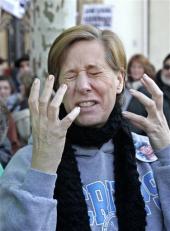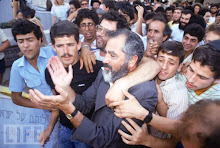This the first of a two part series.Many of you have been asking me to explain the confusing, ever changing, mixed up world of Israeli politics. OK, gang, today is that day, but in order to do it so it's more enjoyable for everybody, I have decided to conduct this class at MZ's bar. I'll be pouring generously for the occasion, which will of course be compliments of the house, so grab yourself a bar stool and belly up; this political party is about to begin!
The KnessetOK, to learn about the current political landscape in Israel, one must first understand how the Knesset works. The Knesset consists of 120 members who are elected by Party list according to proportional representation of the popular vote. A party must receive at least 2% of the popular vote to gain a seat, and a government must consist of at least a simple majority of 61 seats.
No single party has ever come close to garnering 61 seats on their own, so coalitions are formed between parties to achieve a knesset majority.
--Drink Break! MZ is pouring lemon drop shots!--Now, Israeli law forbids racist or anti-Semitic parties, but because the judiciary in Israel is contaminated with leftists (sound familiar?) openly jihadist parties do exist. On the flip side, the rightwing Zionist Kach Party, which was led by the late Meir Kahane, was banned from Israeli politics and listed as a terrorist organization primarily because they wanted to expel the arabs from Israel by force. Seem fair? I don't think so.
General elections for the Knesset are scheduled to be held every 4 years, but no confidence votes to dissolve the government routinely force early elections like we are about to see in March.
So, now that it's been generally explained how the Knesset works, let's do a quick shot of tequila, grab a beer chaser, and move ahead to the current political landscape in Israel.
Current Political LandscapeThe Knesset as of December 19th.
- Likud.........................................25 seats
- Labor.........................................20 seats
- Kadima......................................18 seats
- Shinui........................................15 seats
- Shas...........................................11 seats
- National Union......................... 8 seats
- Meretz.......................................6 seats
- United Torah Judaism.............5 seats
- National Religious Party..........4 seats
- Hadash (Arab)............................3 seats
- Balad (Arab)...............................3 seats
- United Arab List.........................2 seats
OK, so what does all this all mean you ask? Here's another pitcher of beer and a round of kamikazes to mull it over with. Ready? Ok, the coalitions are in total disaray right now since the fall of the government and the launching of the newly formed Kadima party by stroke victim PM Ariel (Yassir) Sharon, so here is a little breakdown to make it easier.
These are the political parties which are most alike, and the most likely to form coalitions together after the March elections.
Kadima and Shinui
These two parties currently account for 33 seats in the knesset. Shinui is considered the most libertarian of the parties, and holds deeply anti-religious sentiments. Sharon is also a secularist, though not quite as militantly so as Shinui leader Tommy Lapid, leaving these parties as almost mirror images of each other.
Both Sharon and Lapid believe in making territorial concessions to the "Palestinians" wherever Jews are in the minority, a free market economy, building the separation wall, advancing liberal social policy, and increasing the separation in Israel between Torah and State.
Let's call this the Concessionist Right coalition. In the coming elections they will likely increase their combined knesset membership from 33 to about 40 between them, with Sharon's party getting about 35 seats and Lapid about 5.
Labor and Meretz
These two parties currently account for 26 seats in the knesset. Meretz is considered to be the foremost party of the Peace Now left. Their agenda is pacifist and socialist oriented, and are currently being led by Yossi Beilin, who's considered to be the principle architect of the failed Oslo and Geneva accords. Meretz is essentially an offshoot of the most liberal wing of the Labor Party, and exists primarily to advance "Palestinian" rights and other various leftwing human rights causes.
However, now that the Labor Party has elected socialist union chief Amir Peretz to head the party ticket, the line between Labor and Meretz is very blurred. The two parties are best compared to a union of proletariat (Labor) and intelligencia (Meretz) politics.
Both Peretz and Beilin believe in granting generous territorial concessions to the "Palestinians", though it could be argued that Meretz would even lean toward advocating a bi-national Israel/Palestinian State if given the opportunity, a socialist economy, very liberal social policy, and increacing the separation of Torah and State.
Let's call this the Concessionist Left coalition. In the coming elections they are likely to gain some seats from Sephardic Jewish voters who traditionally vote Likud because of the fact that Peretz himself is Sephardic, but Meretz will be reduced to almost nothing and many Laborites who are more to the center will vote for Kadima this time around. Let's call it a push, and say the Labor Meretz parties net the same 26 seats they combine for today.
--MZ is setting up cosmos for the ladies and single malts for the guys! --
Shas and United Torah Judaism (UTJ)
These ultra-Orthodox (Hareidi) parties currently combine for 16 seats in the Knesset. They are primarily interested in matters of maximizing government benefits for their Yeshiva studies, military deferments, and housing. Shas represents the Sephardic Hareidi Jews while UTJ is a union of the Chassidic and Mitnagim Hareidi, and are primarily Ashkenazi Jews.
They are relatively detatched from all other matters, and they believe it is their religious obligation to support whatever government is currently in power. Their preference is to not throw out Jews from their homes and concede land to the Arabs, but they are not activists regarding this and usually will advance whatever the government wishes so long as it does not compromise their benefits.
There is some friction in the Hareidi camp right now about the future role they should play regarding stands on Jewish expulsions, as many feel strongly that it is an abomination to support such legislation, while others believe it is only their obligation to advance the benefit packages they can receive to advance their Jewish studies.
In all likelihood not much will change, though, so let's again say we have a "push" and give the Hareidi block the same 16 seats next time that they have in Knesset today.
National Union and National Religious Party
These two parties represent the Rightwing of Israeli politics. The NRP is the traditional party of Religious Zionism and believe that advancing Judaism in Israel is the answer to the problems that plague the Jewish State. They are the Religious Right, if you will, and have always held the belief that all the land west of the Jordan River belongs to the Jews as an eternal ineritence promised from God to Abraham, Isaac and Jacob, and that it is the obligation of all Jews to settle the Land to prepare for the Third Temple and the coming of Moshiach.
NRP has shifted to the Left, however, as seen by the defections of ex-Party leader Effie Eitam and MK Itzhak Levi to the National Union because of the NRP's tacit enabling of the Gaza expulsion. The defacto NRP head, Zev Orlev, is less ideological and more pragmatic than the constrituency, and is willing to concede "Land for peace" like the Hareidi do in exchange for the government's religious benefits.
The National Union is a combination of religious Zionism and secular nationalism. They do favor making Israel more religious like the NRP, but are much more hawkish on defense and their first priority is to fight any and all proposed land concessions. Benny Elon is the party leader, and he penned the "Jordan is Palestine" peace initiative to transfer the Palestinian population east of the Jordan River and make Jordan the real Palestinian State.
The National Union grew very large in the eyes of Israeli nationalists who oppose Land for Peace initiatives when they stood front and center in the fight against it, and are very likely to increase their number of seats in the March elections as a result. The NRP, meanwhile, is polling terribly as their base is shifting away to the National Union due to the weakness that Orlev showed in opposing Sharon's withdrawal.
Economically, both parties favor free market capitalism (National Union more so), both fundamentally oppose any Land concessions, both are socially conservative and want to see more Judaism in Israel.
We'll refer to this block, therefore, as the Nationalist Right coalition. What will probably happen to NRP is they will either merge with the National Union or risk failing to get a single seat in the Knesset. Assuming they do merge, the polling shows an increase to 15-20 total seats, and we'll split the difference here and say a total of 17 seats will represent this block in the knesset.
Hadash, Balad, United Arab List
This Arab block makes up a total of 8 seats in the Knesset. Hadash is actually sprinkled with the most extreme of the self-loathing Jews who don't believe Israel has a right to exist, while Balad calls for a bi-national state with the extinction of Israel, and the UAL calls for a two state solution, with Jerusalem as the capital of Palestine.
These parties are virulently anti-Semitic and won't attract more seats than they currently own. If anything, they will get fewer, as the most anti-Israel Palestinians don't vote, and the ones who do will also throw votes to the Concessionist Left coalition.
Expect the same 8 seats to come from this rabble we'll call the Arabist block.
End of Part One. Part two to follow tomorrow. Time to bottoms up that last round of brew!
-MZ

